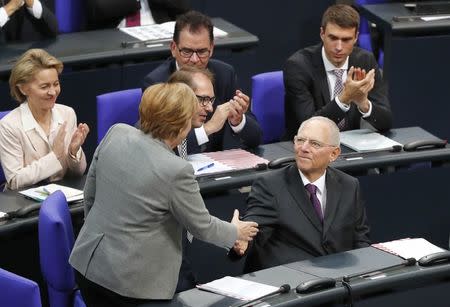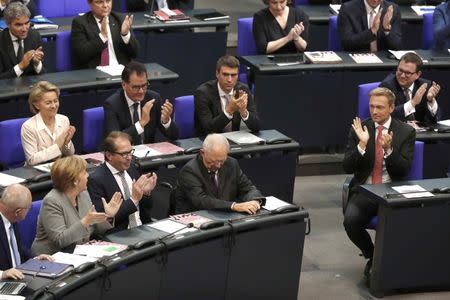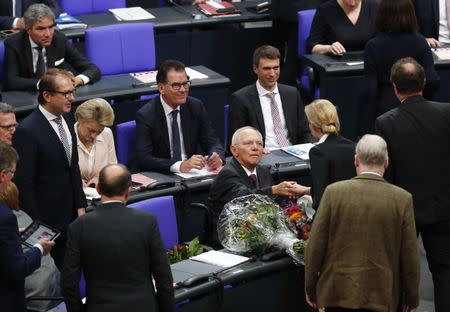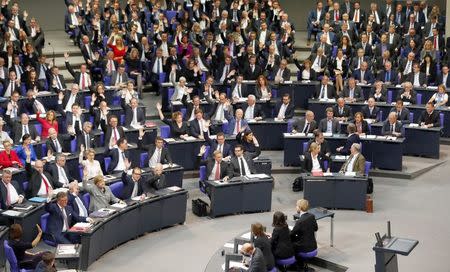Germany's Schaeuble elected Bundestag speaker to tackle far right
By Paul Carrel
BERLIN (Reuters) - Former finance minister Wolfgang Schaeuble was elected speaker of Germany's lower house of parliament on Tuesday, tasked with keeping order in a body where decades of conciliatory conventions are under threat from the arrival of the far right.
In an inaugural Bundestag session following the Sept. 24 federal election, lawmakers from the other parties showed their disdain for the far-right Alternative for Germany (AfD) party by overwhelmingly rejecting its candidate for deputy speaker.
Convention holds that each party represented in the Bundestag names a deputy speaker. But lawmakers spurned AfD candidate Albert Glaser in three rounds of voting.
Still, the AfD, which has become the first far-right group represented in Germany's parliament for more than half a century, made clear its intention to shake up German politics on the national stage.
"The people have decided, now a new era begins," AfD parliamentary leader Bernd Baumann told the chamber.
Schaeuble, who won 501 of 705 votes for the post of speaker, shot back in his maiden speech: "Nobody on their own represents the people."
GRAVITAS
Germany's longest serving lawmaker, 75-year-old Schaeuble is one of the country's most respected politicians and seen as well qualified to tame recalcitrant lawmakers.
By agreeing to move to the Bundestag, Schaeuble has opened the way for the liberal Free Democrats (FDP) to take over his powerful Finance Ministry, helping to unblock talks on an expected new three-way coalition with the Greens.
The conservatives, FDP and Greens convene on Tuesday evening for coalition talks.
FDP leader Christian Lindner told broadcaster n-tv that Schaeuble was an extraordinary figure in German politics:
"He has gravitas, a clear position and a natural authority that will be good to have in a parliament that has just become more diverse, and where some manners may be called into question."
The AfD's Baumann shocked other lawmakers by suggesting that they had used Nazi-era tactics to prevent Glaser from taking a deputy speaker post. FDP politician Marco Buschmann said the comments were "beyond tasteless."
The AfD can nominate an alternative candidate for deputy speaker. Although there is precedent for a party's first choice being rejected, there is no precedent for a party failing to have any lawmaker accepted in the post.
The convention that each party in parliament is entitled to one vice speaker is not written into the constitution, and parliamentary business can continue if the AfD is unable to get a vice president elected.
(Additional reporting by Andrea Shalal; editing by Peter Graff)

 Yahoo News
Yahoo News 






